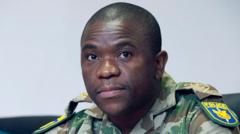Despite a long history of corruption and instability within the South African police force, a gripping press conference held by General Nhlanhla Mkhwanazi has brought these issues into stark relief. The police officer, known for his fierce dedication to his duty, accused Police Minister Senzo Mchunu of having connections to organized crime groups infiltrating the highest levels of President Cyril Ramaphosa’s administration. Donning military-style attire alongside masked officers, Mkhwanazi claimed that Mchunu had dismantled an elite unit tasked with investigating political murders after it discovered a drug cartel with wide-reaching influence across various sectors, including business and the judiciary.
"We are on combat mode, I am taking on the criminals directly," stated Gen Mkhwanazi during his live televised address, which sent shockwaves throughout the nation. Dr. Johan Burger, a leading crime expert, remarked on the critical state of organized crime in South Africa, pointing to previous incidents, including the conviction of former police chief Jackie Selebi for corruption.
Mchunu dismissed Mkhwanazi's allegations as "wild and baseless", but the public has largely rallied in support of the esteemed officer. #HandsoffNhlanhlaMkhwanazi trended on social media, illustrating a significant public backing despite Mchunu's attempt to dismiss the credibility of the claims. Observers note that Mkhwanazi, who has a history of challenging corruption within the police force, established himself as an unwavering figure when he suspended crime intelligence head Richard Mdluli over corruption allegations nearly 15 years ago.
However, the disbandment of the investigative unit, which was investigating political killings in the turbulent province of KwaZulu-Natal, precipitated Mkhwanazi's recent outcry, as he highlighted 121 unresolved case dockets.
The Human Sciences Research Council has indicated that public trust in the police is at a record low, with only 22% of citizens having confidence in law enforcement. The institution has further suffered from a string of corruption cases, inefficient leadership, and a lack of effective crime management.
While Gen Mkhwanazi has faced scrutiny from some factions, his reputation as a "cop's cop" has garnered substantial public support, suggesting citizens may overlook the controversial methods employed by his precinct. With the impending change in leadership, as a new acting police minister assumes duties, Mkhwanazi's future hinges on substantiating his claims against Mchunu, as he aims to shed light on the entrenched corruption plaguing South Africa's police force.




















